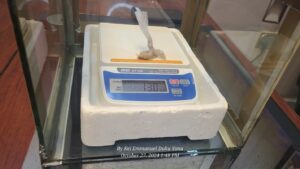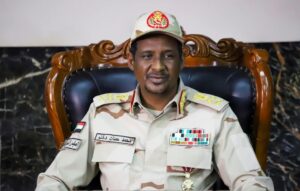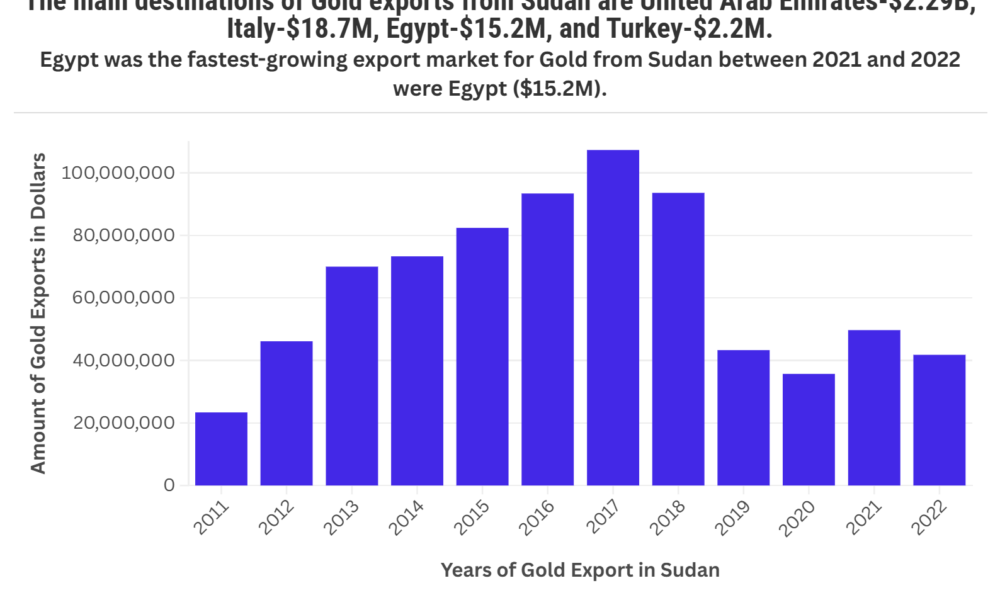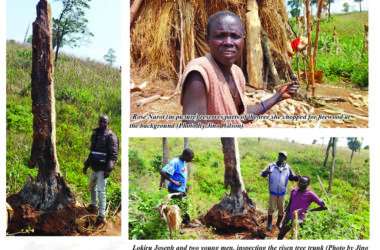By Kei Emmanuel Duku
Despite the ongoing conflict between the Sudanese Armed Forces and Rapid Support Forces, gold mining in Sudan remains a lucrative business.
At the beginning of this year, the Sudanese Mineral Resource Company reported a boom in gold exports, totaling $428 million in the first quarter of 2024.
Just before the war started in April 2023, Sudan was the fourth largest gold producer in Africa and 16th globally. Its gold trade amounted to over $2 billion. However, the illegal gold export in Sudan is estimated to be two to three times higher than the official records.
The informal nature of much of Sudan’s gold production leads to significant economic activity but also results in substantial revenue losses due to smuggling and lack of regulation. Estimates suggest that between 50% and 80% of Sudan’s gold produced is smuggled to the United Arab Emirates and Europe, either through South Sudan or directly by militia operating in the gold-mining regions through Chad and Libya.
Ali Mohana, a Sudanese businessman operating Teyhib Alhakele Jewelry Shop and gold dealer in Malakia Town, Juba, South Sudan says that he buys gold from artisanal miners in Kapoeta in Eastern Equatorial State, Gorom and Luri in Central Equatorial State, as well as miners from Nubia Mountain in Sudan, which borders South Sudan’s Upper Nile State.
Apart from the Nubia Mountain areas, he also states that the majority of the gold smuggled into Juba currently originates from the Darfur region of Sudan.
Mohana also explains that South Sudanese from Maban County in Upper Nile crossed into Sudanese territories, mined gold, and smuggled it back home. This found its way to markets in Juba through Juba International Airport or by road.
Currently, in Juba, one gram of gold ranges between USD 60 and USD 65, depending on the exchange rate of the dollar.
Mohana explains that after buying from the artisanal miners, he smelts the gold in his shop, and then sends it to Dubai via Juba International Airport for processing. The finished gold items like jewelry are then exported to South Sudan and other countries at a higher price. For example, Mohana says necklaces, wedding rings, or earrings cost between USD 80 and USD 95 per gram.

Profitable, But not so Rosy Business
Mohana, who has spent more than ten years in Juba, says the gold business used to be dormant. However, after the Sudan conflict that started last year, few South Sudanese are embracing trade as a means of saving money due to the unavailable foreign exchange in the country.
Despite being a profitable business, Mohana notes that they face challenges such as low production and the absence of a gold refinery in South Sudan.
In March 2023, the government of South Sudan launched an Egyptian gold refining company called BTC Global.
The company was supposed to buy and sell raw gold, scrap gold, and nuggets using the most advanced technology, however, Mahana says that this company only operated for six months and closed due to a limited quantity of gold and suppliers in South Sudan.
Waleed Mohamed, another Sudanese gold dealer operating Damas Jeweler and Gold Shop in Juba, explains that South Sudan and Sudan’s gold is of high quality, and as such, the demand is high globally. He notes that the gold purity of South Sudan and Sudan ranges between 18 and 23 karats.
According to Mohamed, gold from the Darfur region is smuggled from Sudan to Wau Town, the state capital of Western Bahr el Ghazal, through Raja County by road before being flown to Juba. He notes that currently, he has gold suppliers from the Eastern Democratic Republic of Congo, the Darfur region in Sudan, and within South Sudan. He smelts gold three times a week before exporting it to Dubai.
Without naming any company in Dubai he deals with, Mohamed says once he exports gold to the UAE, it takes about a week to be processed into different items before he imports them.
Mohamed explains that the gold trade is flourishing in South Sudan. However, the major threat remains gold middlemen from the Eastern Democratic Republic of Congo, who always smuggle fake gold nuggets to Juba.
He recalls the time he was defrauded of over $3,000 and his colleague over $80,000 last year by Congolese gold dealers who sold to them fake gold.
Gold dealers also point to the fact that Juba City Council remains a big challenge as well. They accuse the council of heavy taxation. Mohamed says that last year he paid USD 500, but this year the City authorities wanted him to pay USD 2,000 in taxes.
Sudan Conflict and Gold Trade

Mohamed’s narration sheds more light on gold smuggling and insecurity. He narrates that Sudan’s gold in the Darfur region is smuggled to the Ghanaian capital, Accra. He accuses the Rapid Support Forces, led by Mohamed Hamdan Dagalo, commonly known as Hemedti, and his armed militia groups of the rampant smuggling trend.
From Ghana, the gold is then flown to the United Arab Emirates, France, and other European countries, however, Mohamed does not specify the means of transport and routes used by the militia to smuggle gold.
However, two separate Investigations published by CNN World, first in July 2022 and April 2023, revealed that the Rapid Support Forces had strong ties with the Russian government or the Former Soviet Union.
The April 2023 investigations stated that before the conflict both Gen. Abdel Fattah al-Burhan, Sudan’s military, and RSF leader Dagalo previously received backing from Russia.
Burhan and Dagalo also were allies and fought together to overthrow former President Omar Hassan al-Bashir in joint coups in 2019 and 2021 with the backing of the UAE and Saudi Arabia.
The July 2022 CNN investigation exposed strong ties between Moscow and Sudan’s military leadership, who granted Russia access to Sudan’s gold areas in exchange for military and political support. The relationship began in earnest after Moscow’s 2014 invasion of Crimea, when Russia began to eye African gold riches as an avenue to avoid a slew of Western sanctions.
The 2022 invasion of Ukraine and the wave of sanctions that followed accelerated Russia’s gold plunder in Sudan and further propped up military rule, increasing Wagner activity in the country.
Mohamed notes that the gold smuggled to South Sudan from Sudan is from artisanal miners and in small quantities. However, big mining companies such as Al-Junaid Company, owned by Mohamed Hamdan Dagalo, use heavy machinery for crushing rocks and extracting gold in large quantities.
He further attributes the current conflict in Sudan to the control of natural resources such as gold, which is largely under the control of the armed militias linked to Hemedti. He notes that the proceeds from the gold were used for the purchase of fuel, ammunition, vehicles, and other military equipment, exacerbating the suffering of the Sudanese people.
“Russia, Saudi Arabia, Yemen, Eastern Libya, and parts of Chad are the smuggling routes for Sudan’s gold and other natural resources, and at the same time, ammunition is supplied through these countries,” he explains.
He further accused Russia and countries in the Middle East of offering military, logistical support, and militia training linked to the Rapid Support Forces.
In 2014, Human Rights Watch estimated that RSF had 5,000 to 6,000 fighters; in 2023, numbers were estimated to be at least 100,000 fighters. Both the Sudan Armed Forces (SAF) and RSF were recruited as ground troops for the Saudi-Emirati coalition in Yemen, with it being particularly well-paying for the RSF.
Meanwhile, Alhindi Suleiman, a gold businessman who fled the Sudanese conflict from the Gezira Region and now settled with his gold business in Juba, narrates that it took him one week to travel from his home state to reach Renk Town in Upper Nile State in South Sudan before connecting with flights from Renk airfield to Juba International Airport.
Suleiman accuses French nationals working in one of the hospitals in the Darfur region of colluding with artisanal miners and buying their gold cheaply before flying it to Paris. He adds that the Rapid Support Forces in the Darfur region have established an airfield in the area, which is used for smuggling gold to Eastern Libya, while the open border points with Chad, Libya, and Mali are aiding the illicit flow of gold outside the country.
Great Lakes Region Unite against Illegal Smuggling of Natural Resources
The illegal smuggling of natural resources in the Great Lakes region, particularly in the Democratic Republic of the Congo (DRC) and its neighboring countries, poses significant challenges to security, governance, and economic stability.
The region is rich in natural resources, including gold, coltan, diamond, copper, cobalt, Uranium, and other rare earth minerals. However, the illegal exploitation and smuggling of these resources has become rampant, often involving armed groups and organized crime networks. This illicit trade not only undermines local economies but also fuels ongoing conflicts and instability in the region, especially in Eastern DR. Congo and the Northern Part of Sudan.
The illegal smuggling of these minerals has deprived governments of crucial tax revenues that could be used for public services and infrastructure development. For instance, over 90% of Sudan’s gold is smuggled out of the country, where it is refined and exported to international markets. This hampers Sudan’s economic growth perpetuates poverty in resource-rich areas and fuels conflicts.
Spotlight on the International Community
Mohamed Basher Abdalla- Sudan’s Minister of Minerals, accuses the Rapid Support Forces of killing civilians and raping women and girls in the Darfur region. As a result, thousands have fled, leaving the area for the rebels to exploit gold resources.
Minister Abdalla further accuses unnamed regional leaders from some regional countries of facilitating the smuggling and transportation of illegal gold and other natural resources.
According to Abdalla, apart from the illegal smuggling of gold and other natural resources, some regional and international countries facilitate the illegal flow of small firearms and light weapons that support rebel activities. He for example accuses the United Arab Emirates (UAE) of funding and arming the RSF.
Apart from the UAE, the Minister also notes that the RSF has a strong link with other Arab militias from West African countries such as Chad, Central African Republic, Mali, and Niger as well as other Western nations.
Abdalla also observes that RSF has close ties with the Russian Wagner Group and Libyan Field Marshal Khalifa Haftar. The Proceeds they get from the sale of gold to the West are used for paying for military equipment and managing its operations.
He argues that Member States within the Great Lakes regions need to reiterate their commitment against the illegal exploitation of natural resources in the region by taking concrete actions against terrorists who are financing their war activities with proceeds from gold and other natural resources. One of the ways is through implementing the Regional Mineral Trucking and Certification (RMT&C) Scheme.
“Joint management of the security of common borders, enhancing, promoting, and maintaining cooperation in the future peace, conflict prevention, and peaceful settlement of disputes and promoting Intra-State cooperation will help in reducing the smuggling of minerals and combating the illicit proliferation of small arms and light weapons that fuels transnational criminal activities and terrorism” he explains.
On a positive note, Abdalla observes that despite the current conflict in the country, the government still controls major gold deposits in the Eastern, North Sudan, Red Sea, Greater Kordofan, Darfur, Kassala, and other areas.
Khartoum and Juba Trade Accusations
There seems to be a trade of accusations between the two neighbors. Martin Guma Abucha, South Sudan’s Minister of Minerals accuses Sudan of smuggling minerals from South Sudan through its open border before exporting United Arab Emirates and other European Countries. He says that the smuggled minerals including gold transit through countries like the Democratic Republic of Congo, Uganda, Ethiopia, and Kenya.
He notes that the South Sudan government is willing to collaborate with countries within the Great Lakes Region in mineral value addition by establishing refineries. This would support the export of processed rather than raw minerals.
The Minister, however, notes that controlling the illegal smuggling of minerals has become a challenge because most of the actors in the sector are artisanal miners who are often situated in remote areas, and sometimes along the international borders.
He estimates that annually artisanal miners produce over 30 tons of gold, and much of this is illegally exported.
He now says that South Sudan is in the process of establishing the minerals trading centers, Mining Authority, and Cooperation to spearhead value-addition, streamline mineral trading, and enforce minerals regulations.
This story is made possible with the support of InfoNile.




